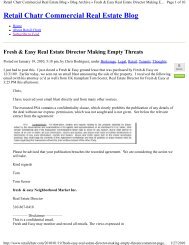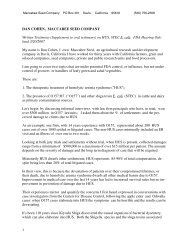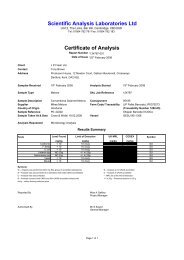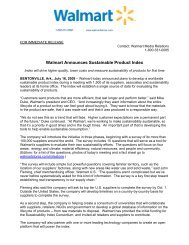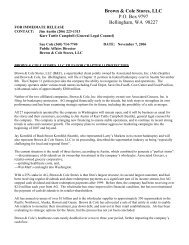BackgroundEWG recently distributed an updated “Shopper’sGuide to Pesticides” that lists 47 fruits andvegetables of which the top 12 commoditieswere shown to have the highest detection rates/numbers of pesticide residues (the “dirtydozen”). The Guide also includes the “Clean15,” a subset of the 47 commodities whichwere shown to have the lowest levels/numbersof pesticide residues. The Guide is available insupermarkets across the country and also canbe downloaded from an EWG-affiliated website(www.foodnews.org).The Guide includes a brief description of themethodology used to construct the list. A relatedEWG website contains slightly more informationon the basis for the list, including a list ofpublished references that were presumablyused in its development. The site contains tworelevant documents including a “Methodology”piece that presents a cursory description ofEWG’s methods for selecting the 47 commoditiesand a “How to Reduce Exposure” section thatincludes additional information about healthimpacts, including a list of citations that EWGalleges supports its claims.EWG’s “dirty dozen” list is as follows (startingwith the “worst”):1. Peach2. Apple3. Bell pepper4. Celery5. Nectarine6. Strawberries7. Cherries8. Kale9. Lettuce10. Grapes (imported)11. Carrot12. PearEWG’s “Clean 15” includes (starting withthe best):1. Onion2. Avocado3. Sweet corn4. Pineapple5. Mango6. Asparagus7. Sweet peas8. Kiwi9. Cabbage10. Eggplant11. Papaya12. Watermelon13. Broccoli14. Tomato15. Sweet potatoEWG assembled the list by analyzing databasesof pesticide residue measurements collected bythe U.S. Department of Agriculture (USDA) inits Pesticide Data Program (PDP) and theRegulatory Monitoring Program and Total DietStudy of FDA’s Center for Food Safety andApplied Nutrition.Within the EWG’s report, the discussion of theputative health effects of pesticide residues isvery limited, and thus difficult to criticallyevaluate. The only reference to this topic is theintroductory paragraph in the Shopper’s Guidew<strong>here</strong> EWG states:“The growing consensus among scientistsis that small doses of pesticides and otherchemicals can cause lasting damage tohuman health, especially during fetaldevelopment and early childhood. Scientistsnow know enough about the long-termconsequences of ingesting these powerfulchemicals to advise that we minimize ourconsumption of pesticides.”4
The above statement does not include anycitations, thus complicating a direct evaluationof its relevance with respect to the amounts ofresidues that have been reported to be presenton the foods listed on the dirty dozen list.Another statement in the “How to reduceexposure” piece states that:“Even in the face of a growing body ofevidence, pesticide manufacturers continueto defend their products, claiming that theamounts of pesticides on produce are notsufficient to elicit safety concerns. Yet,such statements are often made in theabsence of actual data, since most safetytests done for regulatory agencies are notdesigned to discover whether low doseexposures to mixtures of pesticides andother toxic chemicals are safe, particularlyduring critical periods of development. Ingeneral, the government demands, andcompanies conduct, high dose studiesdesigned to find gross, obvious toxiceffects. In the absence of the appropriatetests at lower doses, pesticide and chemicalmanufacturers claim safety since the fulleffects of exposure to these mixtures ofchemicals have not been conclusivelydemonstrated (or even studied).”The most relevant points in this section are thecontentions that studies do not exist on lowdoses of pesticides and pesticide mixtures, bothof which are addressed later.The “How to Reduce Exposure” piece alsoraises issues associated with increasedvulnerability of children and criticism of theEnvironmental Protection Agency’s (EPA’s)regulation of pesticides.Similar to EWG, the Organic Trade Association(OTA) has made statements about the healtheffects of pesticide residues. The OTA focuseson the potential effects of these residues onchildren 1 :“In the past decade, research and analysishas shown that children may be muchmore at risk than adults for pesticideexposure, and may suffer greater harm tohealth and development from exposure.Yet standards for safety and tolerance limitsfor these chemicals rarely include adequateconsideration of risks to children.Recent laws now mandate factoring inthese risks and re-evaluating safety limits,but the wheels of re-evaluation have turnedvery slowly. [Note: OTA infers that this taskhas not been completed. However, it is inerror <strong>here</strong>. The re-evaluation of existingtolerances mandated by FQPA in 1996was completed in 2008]. Organic foods,t<strong>here</strong>fore, may be especially important tomore fully protect children from the risksof exposure, even when pesticide levels infoods are within existing legal limits.Why are children at greater risk? First, theyingest more food and water per pound ofbody weight than adults, so any exposureis greater in proportion to their size.Second, these chemicals may be moreharmful to developing organs and bodilysystems, including neurological andreproductive systems, than they are tomature bodies.In a study published in May 2002 in FoodAdditives and Contaminants, organic foodswere shown to have significantly lowerpesticide residues than conventionally1See http://organicitsworthit.com/environment.html.5



